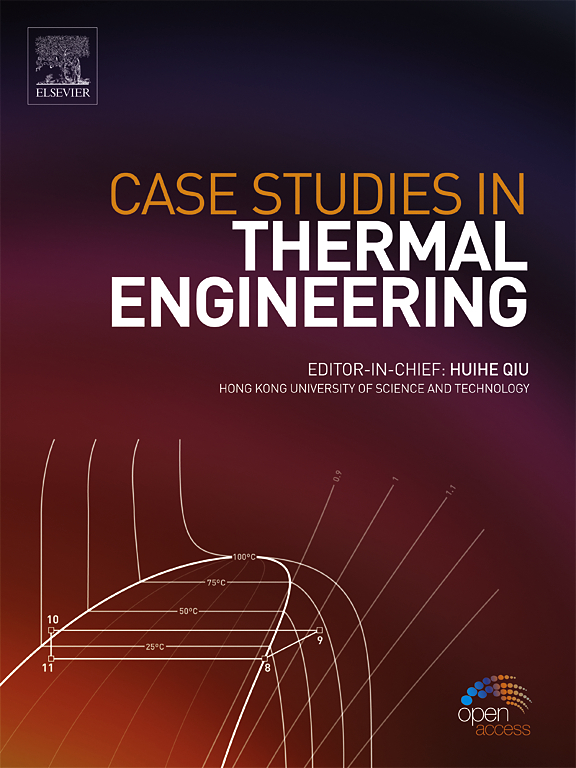Numerical study of parametric effects on heat transfer deterioration of supercritical CO2/DME mixture flowing in a horizontal tube
IF 6.4
2区 工程技术
Q1 THERMODYNAMICS
引用次数: 0
Abstract
Compared to using pure CO超临界CO2/二甲醚混合物水平管内流动传热恶化的参数影响数值研究
与使用纯二氧化碳作为工作流体相比,将二氧化碳与二甲醚(DME)按特定比例混合可以提高传热效率并降低系统运行压力。然而,超临界CO2/二甲醚混合物的传热恶化(HTD)问题得到的关注有限。本文对这些混合物在水平管内的传热特性进行了数值分析。首次系统研究了不同操作参数对高温高温机理的影响,建立了混合热物性非线性与热输运不稳定性之间的多尺度相关性。这些发现为下一代能源系统的安全运行提供了有价值的见解。结果表明,加入二甲醚可以延缓高温变形,而增加系统压力和质量通量有助于减轻高温变形的严重程度。此外,重力加速度导致了局部传热系数(HTC)分布的不对称性。在正常重力条件下(gy = -9.8 m/s2),与零重力条件下(gy = 0 m/s2)相比,观察到HTC的抑制。
本文章由计算机程序翻译,如有差异,请以英文原文为准。
求助全文
约1分钟内获得全文
求助全文
来源期刊

Case Studies in Thermal Engineering
Chemical Engineering-Fluid Flow and Transfer Processes
CiteScore
8.60
自引率
11.80%
发文量
812
审稿时长
76 days
期刊介绍:
Case Studies in Thermal Engineering provides a forum for the rapid publication of short, structured Case Studies in Thermal Engineering and related Short Communications. It provides an essential compendium of case studies for researchers and practitioners in the field of thermal engineering and others who are interested in aspects of thermal engineering cases that could affect other engineering processes. The journal not only publishes new and novel case studies, but also provides a forum for the publication of high quality descriptions of classic thermal engineering problems. The scope of the journal includes case studies of thermal engineering problems in components, devices and systems using existing experimental and numerical techniques in the areas of mechanical, aerospace, chemical, medical, thermal management for electronics, heat exchangers, regeneration, solar thermal energy, thermal storage, building energy conservation, and power generation. Case studies of thermal problems in other areas will also be considered.
 求助内容:
求助内容: 应助结果提醒方式:
应助结果提醒方式:


